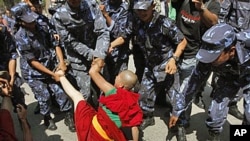The U.S. Department of State, in its most recent Report on International Religious Freedom, stated its concerns for the preservation of the Tibetan people’s unique religious, cultural, and linguistic heritage and the protection of the fundamental human rights of all Chinese citizens.
During the reporting period from July 1, 2009, to June 30, 2010, the Report stated, "The level of religious repression in the Tibet Autonomous Region and other Tibetan areas remains high, especially around major religious holidays and sensitive anniversaries. The government remained wary of Tibetan Buddhism and the central role traditionally played by the Dalai Lama and other prominent Tibetan Buddhist leaders."
The Report noted that "control over religious practice and day-to-day management of monasteries and other religious institutions continued to be extraordinarily tight since the spring of 2008 outbreak of widespread protests and unrest in Tibetan regions." Chinese government restrictions included "forcing monks and nuns to undergo extensive patriotic education ... to denounce the Dalai Lama and to study materials praising the leadership of the Chinese Communist Party and the socialist system."
The State Department said that the Chinese government "reportedly removed hundreds of monks under the age of 18, unregistered monks and nuns, and monks and nuns from outside of designated regions. They also removed hundreds of schoolchildren from schools attached to monasteries. Local authorities frequently pressured parents, especially those who were CCP members or government employees, to withdraw their children from monasteries in their hometowns, private schools attached to monasteries, and Tibetan schools in India."
On the Tibet-Nepal border, reports state, the government increased security to prevent Tibetans from crossing the border without permission, and exerted pressure on the government of Nepal to forcibly return Tibetan refugees.
The Congressional Executive Commission on China’s Political Prisoner Database contains records of 824 Tibetan political or religious prisoners believed to be currently detained or imprisoned. Four-hundred seventy-nine of these 824 are Tibetan Buddhist monks and nuns.
Michael Posner, Assistant Secretary for Democracy, Human Rights, and Labor said in introducing the Report, "The values of religious freedom are universal, enshrined in the Universal Declaration of Human Rights. This report is an important tool in the effort to ensure respect for these values."
Religious Freedom In Tibet

"The level of religious repression in the Tibet Autonomous Region and other Tibetan areas remains high."



